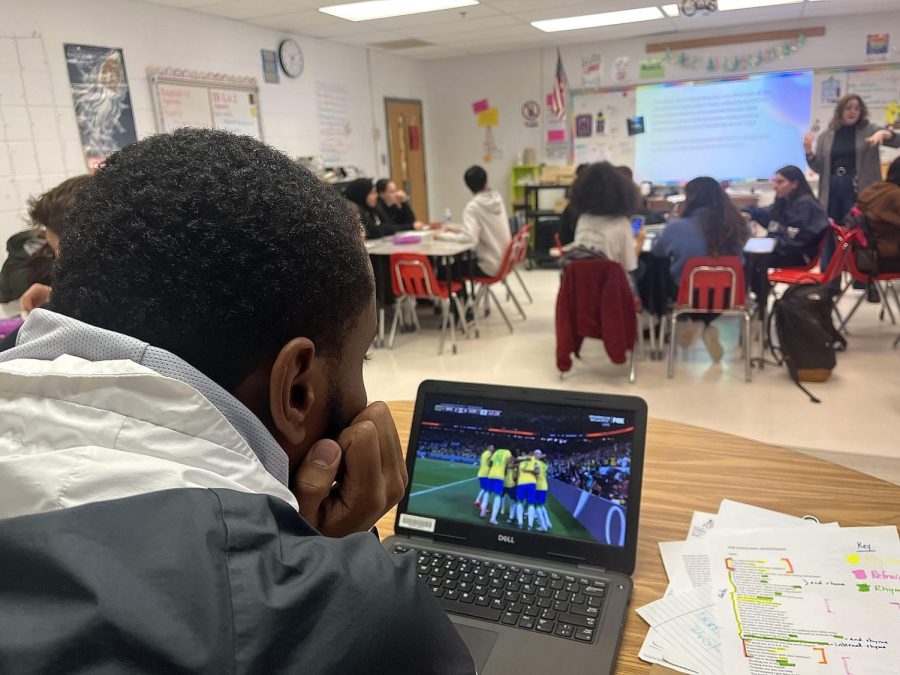World Cup takes a toll on student learning at AHS
Senior Muhajir Adem sits in his English class with his laptop open and eyes glued to the screen. He sits at the edge of his seat watching eagerly as his favorite soccer players dribble down the field and score a goal. The lesson on figurative language finds its way in one ear and out the other. But Muhajir is not the only student placed in this scenario, a majority of students at Annandale have become distracted in the classes which overlap with live World Cup games.
The FIFA World Cup, often simply called the World Cup, is an international association football competition contested by the senior men’s national teams of the members of the Fédération Internationale de Football Association (the International Federation of Association Football), the sport’s global governing body. The World Cup is not only the most renowned association football competition ever, but it’s also the most watched and followed sporting event ever. An estimated 715.1 million viewers, or a tenth of the world’s population, watched the World Cup final, bringing the total number of viewers for the tournament to an estimated 26.29 billion.
The World Cup has been hosted by seventeen nations. While Uruguay, Switzerland, Sweden, Chile, England, Argentina, Spain, the United States, Japan and South Korea (jointly), South Africa, and Russia have each hosted once, Brazil, France, Italy, Germany, and Mexico have each hosted twice. The 2022 World Cup is being held in Qatar, and the 2026 World Cup will be co-hosted by Canada, the United States, and Mexico, making Mexico the first nation to host matches in three World Cups. One reason for the amount of traction which these games receive is because of the pride which people have in celebrating their own countries. The public generally enjoys watching as representatives of their home countries play and win in competitive matches.
Annandale is a community made up of many different cultures, backgrounds, and traditions. The Annandale community is one of immigrants, which all come together to watch and cheer on their countries. Some students cheer on countries which they aren’t even necessarily from but rather are in proximity to.
“I’m cheering on Morocco for this World Cup because I want to see an African country succeed. Although I’m not from Morocco, I am from Ethiopia which is a country in Africa so I feel like I should support the Moroccan team,” senior Ihsan Bedru said.
Another pull factor is the fact that the World Cup only takes place once every four years. The World Cup is held every four years so that the national team playoffs and qualification rounds may be completed. Furthermore, four years gives the host nation enough time to arrange the tournament’s logistics and how to best handle an influx of millions of spectators.
“I personally think that the reason why so many students watch the World Cup during class is because the World Cup only comes around once every four years, it’s rare whereas we’re in school everyday and these lessons aren’t going anywhere. It’s also really nice to watch the games live, so that later on no one can spoil anything.” senior Litzy Rivas said.
With access to electronic devices and soccer matches just one click away, students now are put in a position where they can decide whether or not they want to be attentive in the classroom or tune out the teacher.
Devices and social-media notifications constantly beckon, and in the time of post Covid-19 and widespread remote communication, the distractions have multiplied. Evidence from psychology, cognitive science, and neuroscience suggests that when students multitask while performing schoolwork, their learning is far more fragmented than if they gave the assignment their whole attention. They struggle more to apply their learning in new situations and grasp and recall less of what they have learned. This leads to a drop in grade point average, engagement in class, and more.
The reason why many students feel comfortable doing this is because they believe that they are good multitaskers, and will be able to watch the game whilst listening to the teacher’s lesson. Under most conditions however, the brain won’t be able to carry out two tasks at the same time.
Effective multitasking can only occur if the two tasks at hand are very simple and do not compete with each other for the same mental resources. For example, watching a soccer match and taking notes would be two tasks which compete with the same mental resources.
This leads us to ask, which is more important? Some students argue that the World Cup is an event which only occurs once every four years, which should be enough reason to take precedence over a few missed classes. On the other hand, getting into a routine of not paying attention in class can lead to a number of bad habits such as a lower attention span.
As the World Cup comes to an end, students from Annandale prepare to go back to their regular student life, and await the next world cup in Northern America.

Senior Mariamawit Endalkachew is in her fourth year on the A-blast staff. She is currently pursuing the IB Diploma and is excited for the school year....



